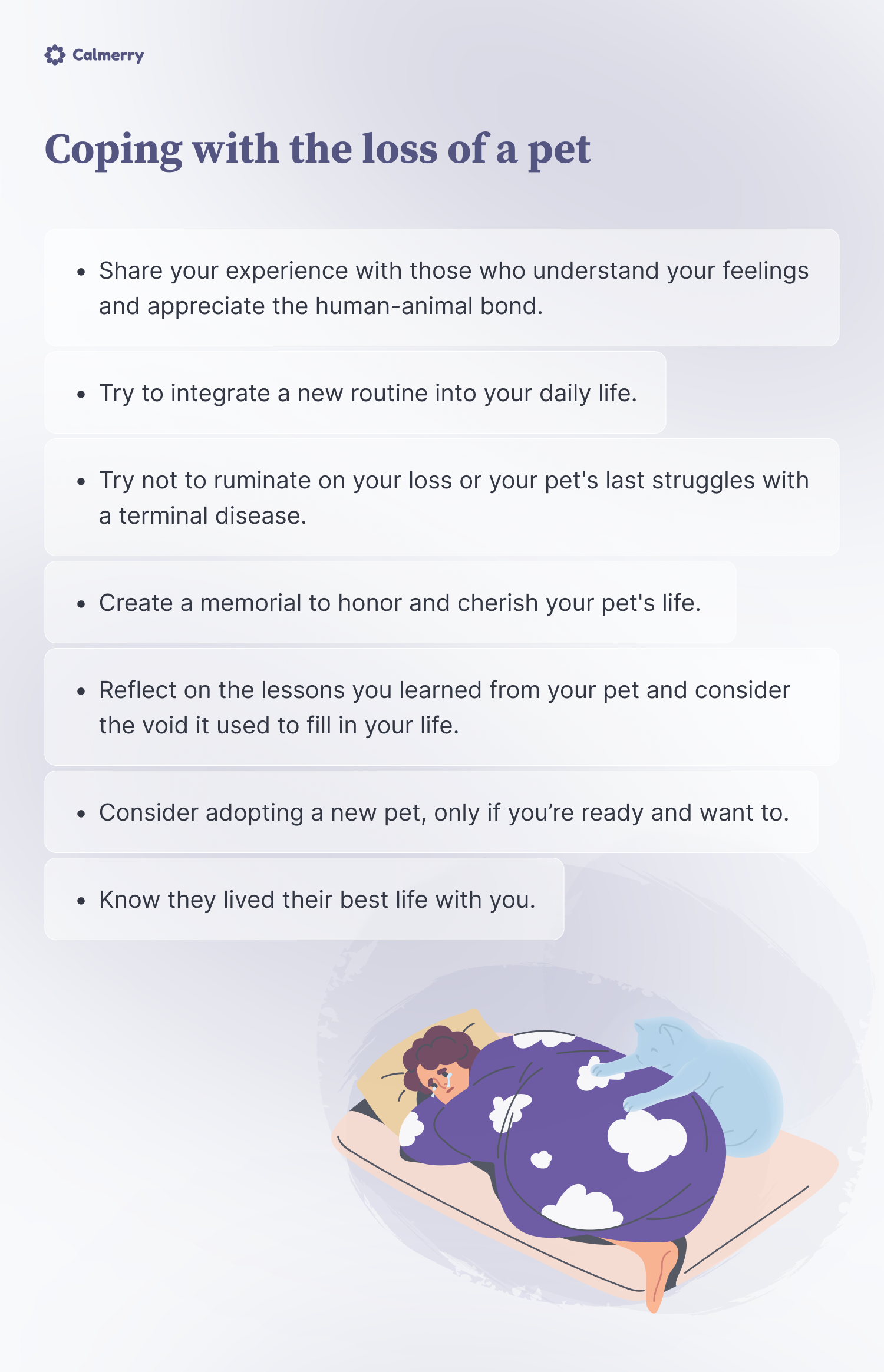Grieving and Coping with the Loss of a Pet

In this article
It’s widely accepted to drive and express sadness over the loss of a loved one and to show sympathy to the grievers. However, displaying your sorrow when losing a pet is not always as well-received.
Many individuals who experience the loss of a pet may feel embarrassed and ashamed to discuss their grief and the associated sadness.
They might even face stigma in public, being labeled as selfish or ignorant, especially when compared to those who lose loved ones in different ways, such as disabling diseases, accidents, war, or natural disasters.
Why does losing a pet hurt so much?
The fact is that anyone who has ever owned a pet is aware of the deep bond between humans and animals, as well as the value that these creatures bring to one’s life.
A pet is not just an animal that coexists with us; it is a companion, a friend who unconditionally loves us and can even be a therapist.
Pets also, to some degree, fulfill our human need to protect and care for someone else.
So, it is quite normal for a pet owner to grieve and experience different stages of grief when losing their pet.
– Sahar Rabie, MD, MSc, Registered Psychotherapist (Qualifying)
The grieving process after the loss of a pet
Similar to the loss of friends and relatives, everyone experiences this loss differently and may show a diverse range of emotions. One may express denial, anger, anxiety, loneliness, and preoccupation with death.
This loss is usually accompanied by various physical symptoms as well, such as pain in different parts of the body, changes in appetite, or alterations in sleep patterns.
For those who had a routine with their pet, this loss may also bring a feeling of insecurity or unsafety in the home.
Also, the impact of loss on each person depends on their personality, stage of life, bond with the lost animal, circumstances under which the pet died, as well as religious and cultural beliefs.

How to manage grieving symptoms and overcome the loss of a pet?
The first step in managing the grief symptoms of a lost pet is to accept your feelings and realize that it is normal to feel this way in such a situation.
You have lost a beloved animal and a close relationship, and there is no shame associated with that. In fact, it is a sign that you are an affectionate person.
1. Share your experiences
Try to connect with animal lovers and share your experience with those who understand your feelings and appreciate the human-animal bond. Maybe you can find a group with similar experiences.
Recognize the importance of having a support group and maintain a healthy boundary with those who don’t appreciate and care about animals. Don’t let them criticize your affection and love for your pet.
2. Try to integrate a new routine into your daily life
If you are used to spending a specific time with your pet, such as going for a walk with your dog in the evening or playing with your cat, it is possible that you feel down and miss them more at this time.
Finding another activity during this time can help you adjust to the loss. For example, calling a friend, listening to music, or gardening can be good replacements.
3. Try not to ruminate on your loss
Reviewing your pet’s last struggles with a terminal disease only causes more pain and won’t help you cope with the situation.
4. Memorialize your pet
You can create a memorial to honor and cherish your pet’s life. If you decide to bury your pet, find a nice spot in your garden or any other meaningful place.
Plant flowers that bloom every year on the grave. Some may choose to keep the ashes in a beautiful jar. You can print and frame some pictures of your pet and place them on your table. Write a short story, poem, or song for your pet.
Ask the vet to prepare a clay paw-print for you. Consider donating money or time to a humane society to provide a better life for other pets as a way to cherish your pet’s memory.
5. Find meaning in your loss
The loss of your pet may lead you to delve deeper and discover a new purpose and meaning for life and death. Reflect on the lessons you learned from your pet and consider the void it used to fill in your life. Determine what changes you want to make in your lifestyle.
For those who believe in an afterlife, they may find solace in the idea of a new place, such as the Rainbow Bridge, where they can be reunited with their pets.
“Just this side of heaven is a place called Rainbow Bridge.
When an animal dies that has been especially close to someone here,
that pet goes to Rainbow Bridge
The animals are happy and content,
except for one small thing;
They each miss someone very special to them,
who had to be left behind.
When you and your special friend finally meet,
you cling together in joyous reunion,
never to be parted again.
The happy kisses rain upon your face;
your hands again caress the beloved head,
and you look once more into the trusting eyes of your pet,
so long gone from your life but never absent from your heart.
Then you cross the Rainbow Bridge together.”
– Edna Clyne-Rekhy
6. Consider adopting a new pet
You may think about adopting or buying another pet. Although the new pet may have a different personality than the previous one, the bond between you and your new pet is still unique and can add a different flavor to your life.
7. Know they lived their best life with you
In the end, appreciate yourself for giving love and making life on this planet easier for an animal. Remember they have felt your love and have been happy with the life you provided for them.
Though they may be absent on earth, they are never absent in your heart, and you have never been absent in theirs either.
– Sahar Rabie, MD, MSc, Registered Psychotherapist (Qualifying)
Get professional help from those who understand
All these tips will help you overcome the loss and cope with the situation.
If, after a few months, you still struggle with intense emotions and find it hard to get back into your daily activities, it is advised to seek support from a mental health professional such as a psychotherapist or grief counselor.
They can provide a safe and non-judgmental space for you to process your emotions.
Remember, you don’t have to go alone through your healing journey.
A word from Calmerry
Here at Calmerry, we recognize the profound bond between pets and their owners. And we’re here to support you through this difficult time.
If you struggle or need someone to talk to, our compassionate grief therapists and counselors are just a click away. Your emotions, like the memories of your cherished companion, deserve a space to be acknowledged and cared for.
online therapy
live video session


